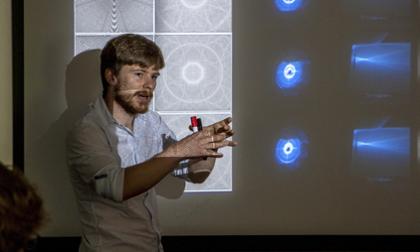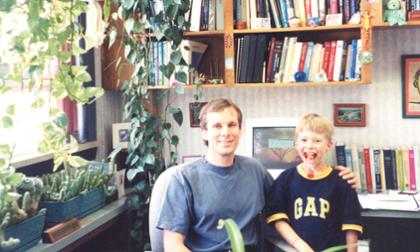The Center was founded in 1996 by Dr. David Hurford, a psychology professor who developed a system to provide evaluation, science-based intervention, and advocacy services for those with dyslexia, all based on best practices.

What is dyslexia?
“It’s a language-based learning disability,” Hurford said. “It’s characterized by difficulties with accurate and/or fluent word recognition, poor spelling, and poor decoding skills.”
Joel is not alone — approximately 20 percent of the general population has dyslexia, making it the most common specific learning disability.
Individuals with dyslexia and other reading difficulties are more likely to drop out of high school and experience a negative self-image. Specific learning disabilities such as dyslexia are often associated with lower academic achievement, lower income, higher rates of suicidality, and higher rates of unemployment.
Today, the Center has become a state, regional, and national resource and a national model for its work to diagnose and help youth who have it.
And Joel?
He recently defended his doctoral dissertation in neurology at the Max Planck Institute in Germany and moved to London for a career in neurological research.
“Pretty good for a non-reader, huh?” said Hurford.

Joel’s story began in early elementary school when he mixed up letters, “backwards and forwards,” his dad, Hans-Peter, recalled.
“He had an over-average ability for memory and visual images — very strong,” he said. “But letters, they gave him challenges.”
Hans-Peter researched programs that could help and in doing so, learned about Hurford’s.
“I wrote to him, and while Kansas is not a place you’d go as a tourist from Switzerland, we decided to spend our summer holiday there and combine it with a few weeks of this course,” Hans-Peter said.
That was in 1999.
“We went to a museum, we went to a rodeo, we saw a typical American city,” Hans-Peter said. “What we found at the Center for Reading was anything but typical.”
The family, which included Joel’s mother Marcella and his brother, Emmanuel, went to Whitesitt Hall for a few hours each day.
There, they received one-on-one guidance from staff trained in Hurford’s strategies.
“They also had a way of engaging Joel’s brother in some of the activities so Joel didn’t feel so alone,” Hans-Peter said.

In the years that followed, Joel learned to manage the disability and was served by a strong support system. He completed high school, attended college, and gained confidence.
“That was important, as a child,” Joel said. “I also learned to take a different approach. To tailor it. I began using a computer for writing, because it was easier to make corrections. I adjusted by attitude to be OK with reading a bit more slowly.”
He went on to study neuroscience in the United Kingdom and chose research as his vocation, spending eight years in a lab in Munich studying visual and information processing — to understand how neuro circuits process information, and how they maintain the ability to do that over time as brains age.
“If we want to understand how the brain works in general, we have to understand its functions and adaptations,” he said.
After earning his doctorate degree, he’s working with two professors in London to reconstruct images that a mouse sees using neural data and recordings. He’ll analyze it to determine how a visual representation can change.
Hans-Peter is proud.
“I’m happy and impressed at what he has achieved so far,” he said. “Parents of children who are Dyslexic should go by examples: There are Nobel Prize holders, many successful people, who have this.”
“When people like David Hurford and well-informed teachers have the tools to measure the degree of it and the tools to help support and correct it, it is just a characteristic of a person rather than a huge problem.”
“This is not something to be scared of, to ostracize people for — it’s merely a way a brain functions,” he said. “You should not try to eliminate your weaknesses, but see them as a fact, then analyze them, figure out how to work with them. Then, work to build up your strengths.”
“That attitude is important for parents of others like Joel to know, and for teachers to know. We were lucky to know David.”

In the years since Joel’s visit, The Center for Reading has also grown and developed: It now employs a full-time director,
also trains educators and school staff in the science of reading, engages in and publishes scientific research, and assists in advocacy efforts related to dyslexia and other reading disabilities.
Only about one-third of students in the United States can read grade level material competently. In Kansas, 69 percent of fourth graders are unable to read challenging grade-level material proficiently. Assessment results indicate that students’ reading skills and their confidence in their reading skills have declined since the pandemic.
Hurford’s team includes:
Learn more about the Center for Reading, dyslexia, and arrange for services at pittstate.edu/Reading